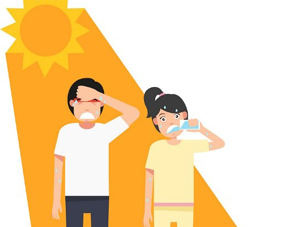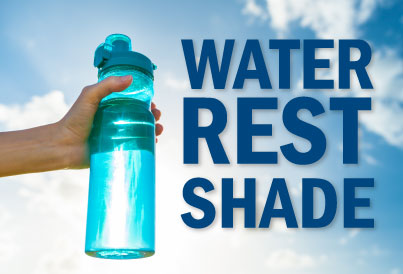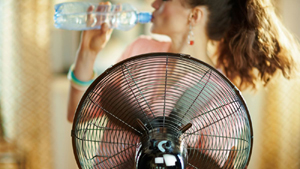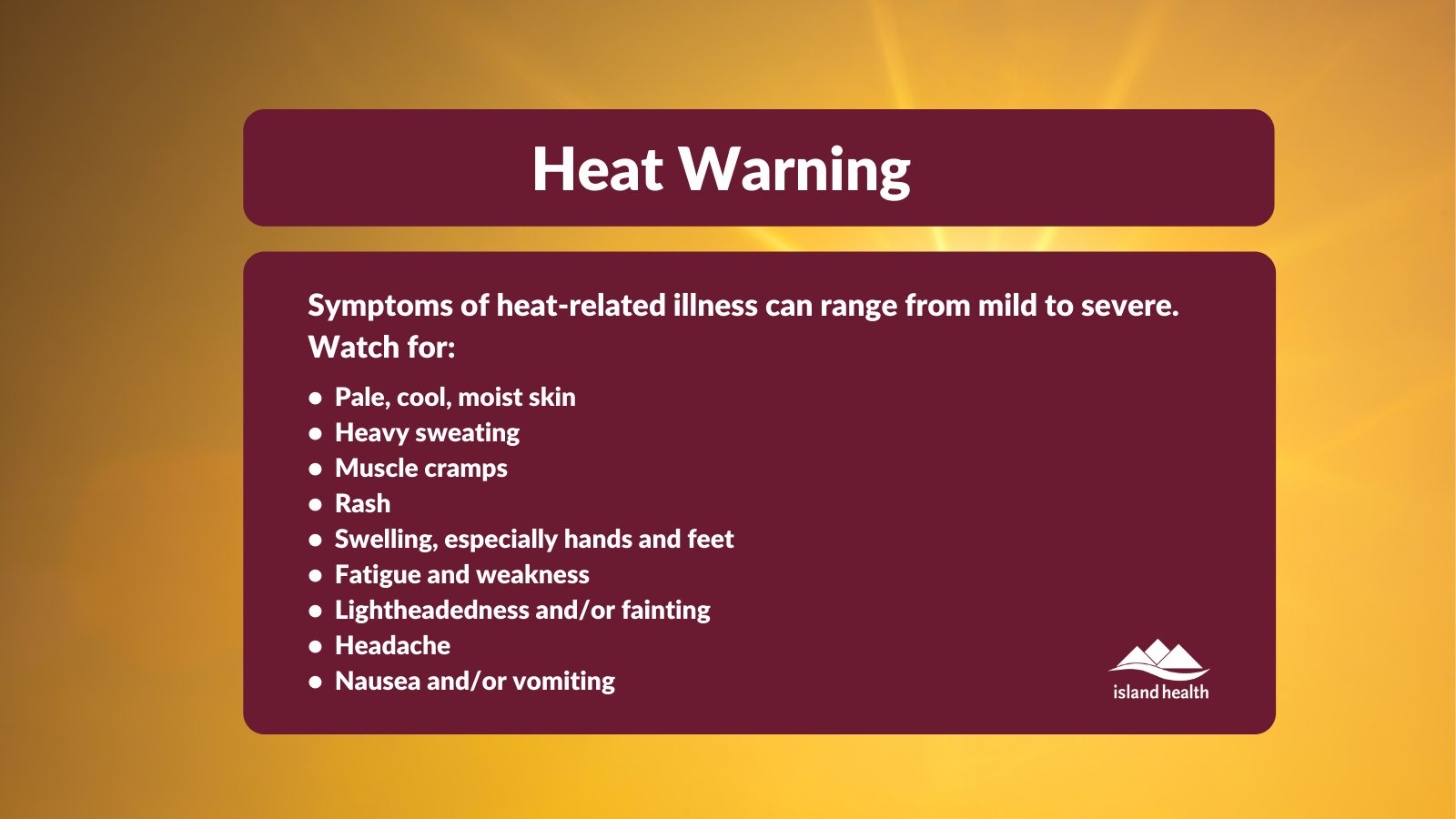
Tuesday August 10, 2021 | VICTORIA, BC
by Mary P Brooke, Editor | Island Social Trends
Environment Canada has issued heat warnings for East Vancouver Island, Inland Vancouver Island, Greater Victoria and the Southern Gulf Islands.
A significant heat wave will affect the south coast of BC in the coming days, Wednesday August 11 through Sunday August 15. The ‘significant warming’ will ramp up on Wednesday and continue through until Sunday morning (maximum strength forecast for Thursday and Friday). This is due to a strong ridge of high pressure.
Environment Canada defines the threat as involving daytime highs ranging from 29°C to 35°C combined with overnight lows of 16°C to 19°C. Humidex values during this period will reach the mid to high 30’s.

Taking this seriously:
It’s possible that more attention will be paid to the impacts of heat on people’s health this time around, after the tragic number of deaths during the heat-dome heat wave June 25 to 29 in BC. At least 568 people died from overheating (mostly in urban Vancouver areas) due to lack of sufficient cooling in their homes, reported the BC Coroners Service last month; mostly seniors living alone were the ones impacted.
In June the BC government was modest in their messaging. Things have ramped up this time with BC Health messaging. This particular heat dome is not expected to be quite as bad as the one in June, but being prepared seems to be front of mind for many.
Island Health heat information:
Island Health has put out an advisory on Twitter, and has posted heat safety information on their website: Find out how to keep yourself and others safe.
Be aware of the symptoms of heat-related illness, check on those at greater risk during extreme and prolonged periods of heat, and follow the tips below to avoid heat exhaustion or heat stroke – while also keeping communities safe from COVID-19.
Heat-related symptoms:
The symptoms of heat-related illness can range from mild to severe. They include:
- Pale, cool, moist skin
- Heavy sweating
- Muscle cramps
- Rash
- Swelling, especially hands and feet
- Fatigue and weakness
- Lightheadedness and/or fainting
- Headache
- Nausea and/or vomiting
More severe symptoms – including high fever, hallucinations, seizures and unconsciousness – require urgent medical attention. Call 911, move to a cool place, and cool the person with water and fanning.
Check on each other:
Anyone can suffer from heat-related illness – but some are at greater risk than others. Please make sure to check the following people regularly for signs of heat exhaustion or heat stroke:
- Infants and young children
- People aged 65 or older
- People with disabilities, cognitive or otherwise, who may need assistance in monitoring their well-being
- Those who require ongoing medication for conditions such as heart or breathing problems
- People who work or exercise outside
- Check in on those who live alone.
- During the COVID-19 pandemic, relatives, friends, and neighbours should check in regularly with vulnerable people by phone or video.
Stay hydrated:

Drink more fluids regardless of your activity level. Don’t wait until you’re thirsty to drink. Avoid liquids that contain alcohol, caffeine or large amounts of sugar, as these are less helpful in keeping your body hydrated.
If you stay inside:
If possible, stay in an air-conditioned place when you are indoors.
- Make your home as comfortable as possible.
- Close blinds and shutters during the daytime and open them at night. Open your windows at night to let in cooler air. If you have children in your home, make sure you’ve taken precautions to prevent falls from windows and balconies.
- If you have air conditioning, use it to take the edge off indoor heat — but don’t over-cool. Remember that circulation of fresh air is important for reducing COVID-19 risk.
- If you don’t have air-conditioning, take shelter in the coolest room in your home and use a fan. Blowing a fan across a pan of ice water can create a cool breeze.
- Electric fans may provide comfort, but when the temperature is above 37 degrees Celsius, fans will not prevent heat-related illness. Taking a cool shower or bath, or spending time in an air-conditioned place, is a much better way to cool off.
- Cool showers and misting yourself and your clothing with cool water will help keep you from overheating.
- Try visiting a public location such as a shopping mall or library – even a few hours spent in air conditioning can help your body stay cooler when you go back into the heat.
- Wear lightweight, light-coloured, loose-fitting clothing
If you go outside:
- Seek cooler, breezier areas when outdoors, such as large parks near to water with lots of trees.
- Avoid crowded spaces and maintain a two-metre distance from others as much as possible.
- Avoid strenuous outdoor activities during peak hours (10 a.m. to 4 p.m.).
- Take it slow with outdoor activities – try to rest often in shaded areas.
- Consider your neighbours: be respectful of pets and humans that need to rest/rehydrate in the shade at new locations temporarily.
- Be sun-safe and remember to protect yourself from the heat:
- Apply sunscreen to exposed skin, early and often, at least 15 to 30 minutes prior to going out. Minimum Sun Protection Factor (SPF) should be 30. Use it liberally and make sure to reapply often throughout the day, especially following swimming or heavy perspiration.
- Seek shade and keep skin covered as much as possible when spending time in the sun. The sun can burn and damage skin even on a cloudy day.
- Wear a hat with a wide brim.
- Children are more vulnerable to sun damage and heatstroke, so ensure their skin is protected or that they are in the shade. Infants under six months old should wear a UVA/UVB protective suit if spending time outdoors.
- Wear sunglasses, especially when driving or cycling. Exposure to ultraviolet radiation (UV rays) can cause cataracts and other eye diseases.
- NEVER leave children or pets alone in a parked car. Temperatures can rise rapidly in enclosed vehicles, becoming much hotter than the outdoor temperature.
For more information on heat-related illness, visit HealthLinkBC, the Government of Canada’s extreme heat page or dial 811.
===== RELATED ARTICLES:
- Greater Victoria weather alert: high temperatures July 27 to 31 (July 26, 2021)
- Smoky air is a health hazard, but heat trumps that (July 24, 2021)
- Summer health hazards: heat wave & wildfire smoke (July 3, 2021)
- Hot weather: stay hydrated & protected from sun during the heat dome (June 25, 2021)
- Summer delivers full week of hot weather (June 21, 2021)





